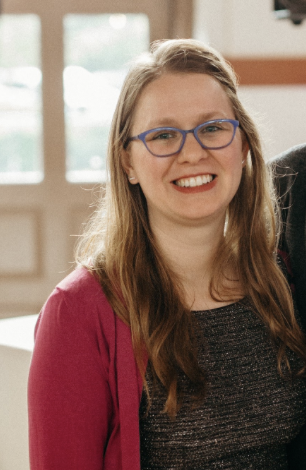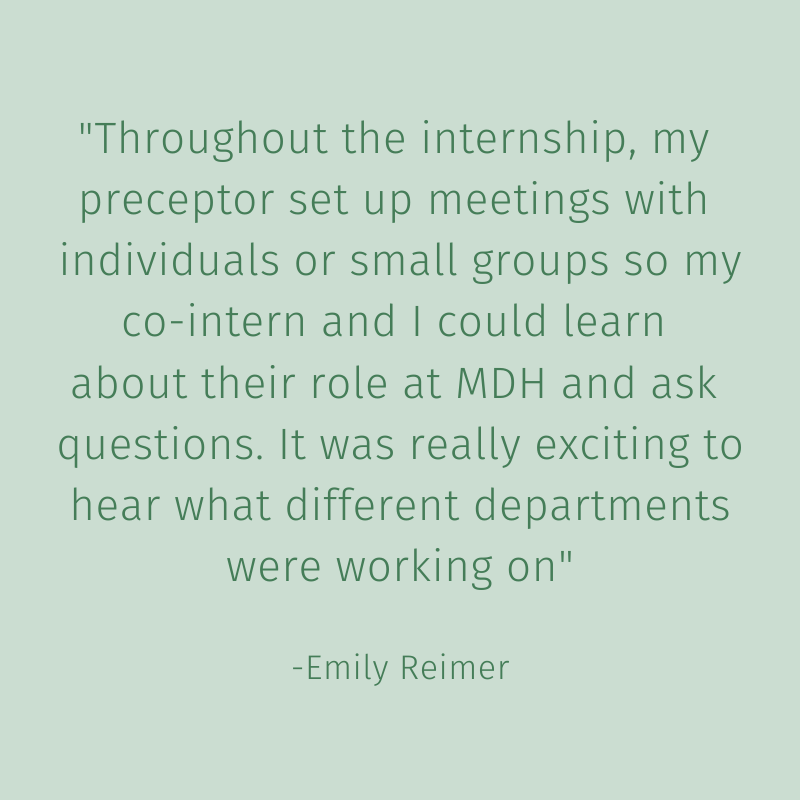#UMNMCH student Emily Reimer (MPH ‘21) wrote this reflection on how her coursework and applied practice experience have all contributed to her career in MCH.
Why I Applied to the Title V Internship Program

In January of last year, I decided to apply for the Title V Internship Program, supported by the National MCH Workforce Development Center. What appealed to me about this program was that it paired MCH students with state (or territory) agencies, to work directly with departments funded by Title V. As a native Minnesotan, I was most interested in working in Minnesota and gaining experience with the Minnesota Department of Health. I also hoped to put either my newly acquired epidemiology, or evaluation, skills to test. A big bonus about this program is that it provides a stipend, which can be hard to come by in Public Health.
During my interview for the program, I was impressed and intrigued by the MCH Pipeline program. The MCH Pipeline program trains undergraduate students from underrepresented minority communities in MCH, with the goal of pipelining these trainees into the MCH workforce. Prior to this interview, I wasn’t aware of this program, but thought it would be valuable to work with a MCH Pipeline trainee.
Program Structure & COVID-19
As COVID-19 started picking up steam, all of the selected trainees for the Title V Internship Program were notified that the Title V Internship would be switching to remote work. I very much supported this decision, but became worried that my internship experience would be different, and potentially less personable, since I wasn’t going to be visiting MDH in person. Upon starting my internship, I was quickly reassured from my preceptor; I would still be able to make connections with MDH employees and that she would do her best to fully integrate me and my co-intern into the team. My co-intern (who was indeed part of the MCH Pipeline program, as hoped) was able to stay in Milwaukee, instead of moving to the Twin Cities, to complete her internship. Throughout the internship, my preceptor setup meetings with individuals or small groups so my co-intern and I could learn about their role at MDH and ask questions. It was really exciting to hear what different departments were working on, amongst their COVID-19 duties.
In some ways, working remote was better than expected – my snacks were incredibly near, I didn’t have any commuting whatsoever, and my garden received lots of attention during lunch time. But, I think like a lot of people this summer, I also felt frustrated and sad being home all day. It was exceptionally hard to stay positive and feel productive. Throughout the internship, I appreciated that the Title V Internship program staff encouraged interns to take time for themselves and to accept that some days wouldn’t be productive.

What I Worked On
My internship had three main goals: conduct a literature review on implicit bias research related to perinatal outcomes, find existing city, state, and organizational policies on implicit bias training requirements for healthcare professionals, and document MN organizations working towards birth equity, MN birth workers or organizations that provide cultural or inclusive birthwork, and MN organizations that provide implicit bias training. A full presentation on these documents can be found here. My co-intern and I divided the work for these three goals and met regularly to bounce ideas off of each other and plan.
Originally my internship included an evaluation component, but due to COVID-19, my work shifted to a topic more readily supported virtually. For me, this was the most disappointing part of my experience. I had hoped to test out my evaluation skills over the summer. All of that being said, focusing instead on implicit bias meant focusing on something incredibly relevant and worthwhile.
What Three Things Did I Enjoy Most?
- Working with my co-intern. My co-intern is a Nutrition student at UW-Milwaukee. It was awesome to have a teammate for our project and I learned so much from her! #dreamteam
- The literature review. I basically read a bunch of academic articles, but wrote an incredibly condensed summary (which is pretty much my dream job).
- Meeting people at MDH: learning what they do and how they got to MDH. We probably met 20+ people over the course of the internship program and everyone was engaging, thoughtful, and positive.
Emily Reimer graduated in May 2014 from the College of Saint Benedict with a degree in Environmental Studies and a minor in Gender Studies. She spent the four years prior to graduate school in the healthcare software industry, working as a project manager for outpatient products. Throughout her career, she worked closely with population health, public health and patient engagement programs. She brings her strong understanding of healthcare systems, passion for women’s health, and interest in the environment to the MCH Program and RA role.
–Read Student Spotlight archives
Interested in learning more about getting a degree in MCH? Visit our MCH Program page for more information.
#UMNMCH #UMNproud #UMNdriven
[Tags] Student Spotlight…